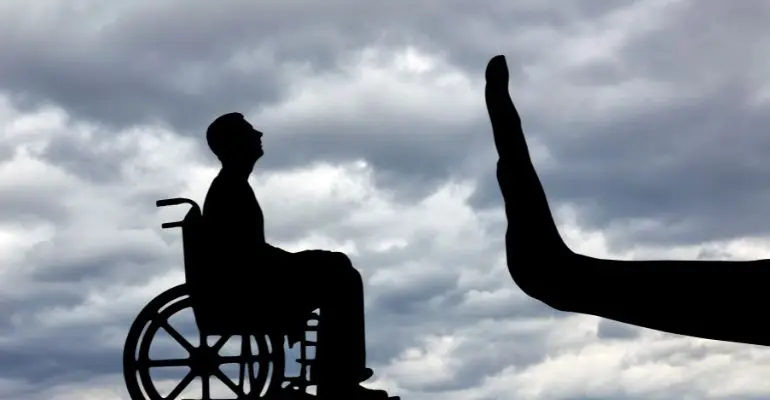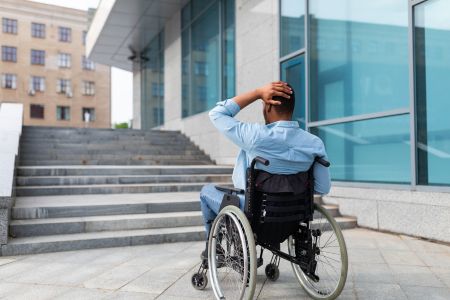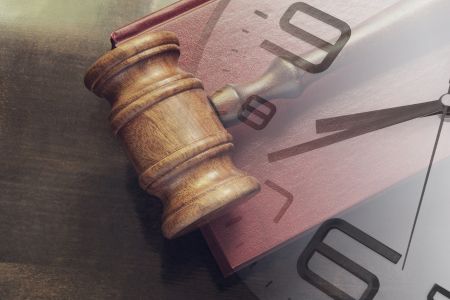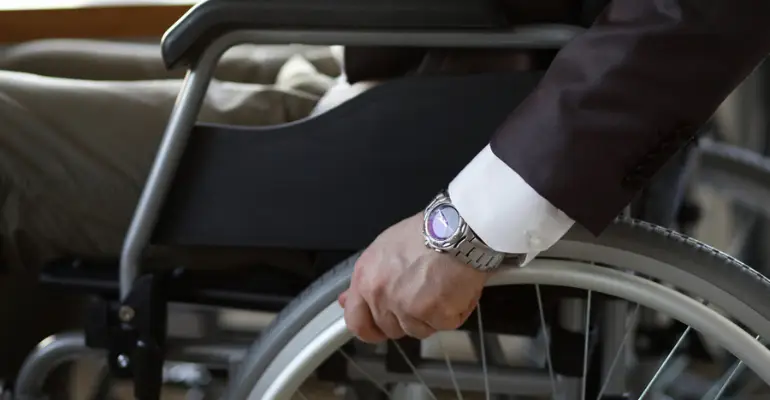Can You Sue for ADA Violations?

Understanding the Americans with Disabilities Act (ADA)
The Americans with Disabilities Act (ADA) is a federal law applicable to states that prohibits discrimination against individuals with disabilities. A person is considered to have a disability if they possess a mental or physical impairment that “substantially limits” a major life activity.
The ADA consists of four titles, each prohibiting discrimination in a particular sphere of society. More specifically,
- Title I prohibits discrimination in employment
- Title II prohibits discrimination by public entities and in public transportation
- Title III addresses discrimination in public housing and accommodations
- Title IV prohibits discrimination in telecommunication services
Several federal bodies are tasked with enforcing these titles. For example, the Equal Employment Opportunity Commission (EEOC) handles alleged violations of Title I, while the Department of Transportation hears complaints alleging violations of Title II. And Title III complaints go to the Department of Justice, Civil Rights Division.
Explanation of ADA Violations
A violation of ADA regulations occurs whenever an entity or business that is subject to its provisions fails to fulfill its obligation to provide reasonable accommodations and access to individuals with disabilities. Covered businesses, accommodations, and entities are required to make reasonable accommodations for individuals with disabilities to access their facilities or use their services.
What constitutes reasonable accommodations is the most frequent source of litigation and dispute. A business or entity is not required to expend all its resources or completely alter its structures to accommodate all potential disabilities. However, a business or covered entity must make accommodations simply because doing so would cost money or involve more inconvenience than they would like.
Examples of ADA Violations

There is no comprehensive ADA violations list. Adding to the complexity of the matter is that what is an ADA violation for one business or entity may not be a violation for another. ADA violation examples include the following:
Physical Accessibility Violations
Physical accessibility violations make it difficult or impossible for individuals with disabilities to access public spaces or private businesses that are open to the public, like hotels and restaurants. One of the most common violations is when a business open to the public lacks an accessible entrance or wheelchair ramp. Not having dedicated handicapped parking stalls can also constitute an ADA violation.
A business or public space does not fulfill its ADA obligations merely by having accessible entrances. Interior spaces like cafeterias, break rooms, and locker rooms must also be accessible to individuals with disabilities.
Communication Access Violations
An ADA communication access violation exists when a business or covered entity makes it impossible for someone with a vision, hearing, or speech disability to communicate effectively with others. To avoid a potential ADA violation, you may notice that many public spaces have signs made with large print or with Braille lettering.
For similar reasons, a public entity may find itself committing an ADA violation if they lack an option for public notices or advisories to be given orally to individuals with hearing impairments.
Other ADA Violations
Other actions can violate the ADA. For example, employers are prohibited from refusing to hire, firing, or discipline employees based on their disability. Moreover, a covered employee must be given reasonable accommodations to perform their essential job duties.
Remedies for ADA Violations

For discrimination in employment under Title I, you could receive back pay you were denied, have your employment reinstated, or be given the promotion you were unfairly denied. And if you did not receive a reasonable accommodation when you asked for one, your employer may be ordered to provide such an accommodation.
In Title III cases, the most common remedy is injunctions or orders directing the business or entity to make specific facility improvements or changes. For example, a public government office or restaurant may be ordered to construct a wheelchair ramp, install an elevator, or make handicapped-only parking available.
The discriminating entity may also be issued fines for committing ADA violations. The value of these fines would depend on how long the violation has existed and the intentionality of the entity’s conduct.
Filing a Complaint with the Department of Justice
You may be eligible to file a complaint with the Department of Justice’s (DOJ) Civil Rights Division if an entity violates your rights under the ADA. The DOJ does not handle ADA complaints involving employment, housing, or air travel, but it will accept ADA complaints regarding any other type of violation.
For instance, the DOJ could investigate a complaint related to a lack of accessibility in a public building or government office. Alternatively, if you experienced disability-based discrimination at a hotel or restaurant — or if your child was discriminated against at school — the DOJ would also receive and review those complaints.
Filing a complaint with the DOJ can be done online, by mail, or by fax. Once the DOJ receives and accepts your request, the department may attempt to mediate a resolution between you and the violating business or entity. The DOJ may also refer your complaint to another federal agency better suited to handle your claim. It could also file and pursue remedies through a lawsuit.
If you choose to file a complaint with the DOJ, it is important to note that the department and its attorneys do not serve as your personal attorney, and they will resolve the complaint in a manner that they feel is appropriate.
Filing a Private Lawsuit
You also have a right to file a private lawsuit under the Civil Rights Act of 1964 if you believe you have experienced discrimination in violation of Title III of the ADA. In a private lawsuit, you and your anti-discrimination attorney decide what remedies to pursue and whether to settle or mediate your claim.
It is also your responsibility, and that of your counsel, to timely file your case and gather evidence and witnesses to support your claim. Then, if there is no settlement, you must present your case to a judge or jury.
To file an ADA private lawsuit, you and your legal counsel would determine whether you have a viable claim. You would also decide whether you are disabled or are able to file on behalf of a disabled person.
Your attorney would subsequently prepare the necessary legal petition. The petition describes the discrimination you experienced, details how such discrimination violates the ADA, and requests certain remedies to address the discrimination.
If your private action is successful, you may be able to recover your attorney’s reasonable fees, which would ensure that you are not left having to cover those fees yourself.
Statute of Limitations for ADA Violations

For example, suppose that you are alleging Title I discrimination based on discriminatory action in the workplace. In that case, you must file a notice with the Equal Employment Opportunities Commission (EEOC) within 180 days of the conduct. Once you receive notification of your right to sue from the EEOC, you then have 90 days to initiate your lawsuit.
Conversely, a private action under Title III of the ADA must be brought within four years of the discriminatory conduct. There may be some exceptions to this limitation if you were physically or mentally unable to file a suit during a portion of this period.
However, such exceptions only apply in limited circumstances. Your ADA complaint lawyer can let you know if any of these exceptions would apply to extend your statute of limitations beyond four years.
Hiring an Attorney for an ADA Lawsuit
While the law does not require that you have an attorney to file an ADA lawsuit, acquiring legal representation can have a dramatic effect on the outcome of your suit. Claims of physical accessibility discrimination, employment discrimination, or any other sort of discrimination may appear obvious to you, but it is not necessarily easy to prove.
An in-depth investigation may be necessary, including consultations with experts as well as people with direct knowledge. An experienced disability rights lawyer will know when such an investigation is warranted, the necessary scope of that investigation, and who is capable of performing the investigation.
An attorney with experience handling ADA complaints can also help you reach an acceptable outcome through either mediation or litigation. If the business or entity offers a settlement, your attorney can help you understand whether that proposed outcome is reasonable in light of your circumstances.
When to Contact an ADA Attorney
Wenzel Fenton Cabassa P.A. is available to assist you in prosecuting a claim for ADA violations. Our firm’s attorneys have years of experience resolving ADA claims outside and inside the courtroom. We are more than prepared to use this experience and knowledge to help resolve your case successfully.
Our firm understands that discrimination in violation of the ADA can be troubling for you on many levels. Whether you have been discriminated against in the workplace or by a business, know that we can help.
We are committed to holding businesses and public entities to their obligations outlined under the ADA. Contact the ADA discrimination lawyers at Wenzel Fenton Cabassa P.A. for a free case evaluation today.
Please Note: At the time this article was written, the information contained within it was current based on the prevailing law at the time. Laws and precedents are subject to change, so this information may not be up to date. Always speak with a law firm regarding any legal situation to get the most current information available.
Related Posts
Recent Posts
- False Claims Act Retaliation & Your Rights
- Fired for Being Pregnant? 5 Situations When You Should Call an Employment Lawyer
- Can My Boss Take My Tips? The Laws of Tip Ownership
- What Does “Meets FCRA Requirements” Mean?
- Can Your Employer Contact You While on Medical Leave? Know Your FMLA Rights in Florida
Contact Us

FREE HELP GUIDES
Dealing with unpaid wages, discrimination or wrongful termination? Get the information you need to protect your workplace rights. We offer employment law resources to help you fight for workplace justice.


